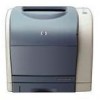HP 2500 HP PCL/PJL reference - Printer Job Language Technical Reference Manual - Page 161
Example, Using the RDYMSG Command, For HP LaserJet 4PJ, 4V, 4MV, 5Si, 5SiMx, and 5Si Mopier printers - color laserjet toner
 |
View all HP 2500 manuals
Add to My Manuals
Save this manual to your list of manuals |
Page 161 highlights
Note Note This command replaces the lowest priority 00 READY message. If any higher priority message is displayed (for example, toner low), the new ready message does not appear until these outstanding conditions are cleared. For HP LaserJet 4PJ, 4V, 4MV, 5Si, 5SiMx, and 5Si Mopier printers, if the LANG variable is set to Japanese, the message is displayed using the JIS X0201-76 character set. For the LaserJet 4000, 5000, 8000, and 8100 series printers, if LANG is set to POLISH, CZECH, or HUNGARIAN, messages are displayed using the Latin 2 (ISO 8859/2) character set. If LANG is RUSSIAN, messages are displayed using Cyrillic (ISO 8859/5). For LANG=TURKISH, the display is in Latin 5 (ISO 8859/9). This is also true for the HP Color LaserJet 4500 printer, except there is no support for Turkish or Hungarian on this printer. Some HP LaserJet printers may have a different limit for the number of display lines and number of display characters. To request the display limits, use the INFO CONFIG command. When this command is used, the printer returns DISPLAY LINES=value and DISPLAY CHARACTER SIZE=value as part of the response message. For example, HP LaserJet 4 and 4M printers return DISPLAY LINES=1, DISPLAY CHARACTER SIZE=16, indicating that the displayed message is limited to 1 line of 16 characters. Example: Using the RDYMSG Command This example simulates a spooler that prints a job from another application. The spooler uses the RDYMSG command to display the name of the person printing the job (while the job is printing). In the example below, the @PJL JOB DISPLAY command has been added to display the job name on the newer printers. (See the note on page 8-2.) After the job is printed, the spooler restores the normal ready message. (The indented command lines indicate those sent by the printing application; the remaining lines are sent by the spooler.) EN Device Attendance Commands 8-3















